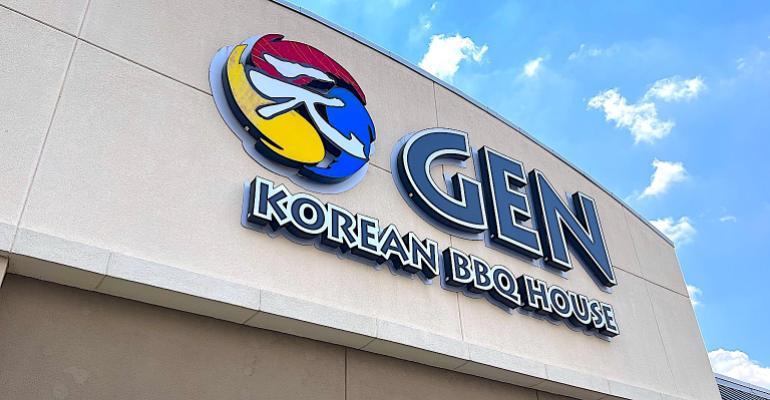GEN Restaurant Group is contemplating some big changes for its GEN Korean BBQ House concept fresh off of its June 2023 IPO. During the company’s fourth quarter earnings call Wednesday, co-CEO David Kim said the 40-unit concept is in the process of testing new food and drink options that are expected to add $20-plus incrementality per guest.
“And they’re getting much higher quality meats,” he said, adding that the company switched distributors from U.S. Foods to Sysco during the quarter.
The test began about three weeks ago, so there isn’t much data yet, but Kim said it has so far been “very positive.” Also as part of this menu initiative, the company is rolling out Soju to all new restaurants, a distilled, grain-based alcoholic beverage that is wildly popular in Korea. The company is also adding other new drinks to restaurants in its restaurants that have a liquor license, which doesn’t include Boston. Kim said liquor licenses are too costly in that market – around $300,000 to $500,000 – and “we can’t make those numbers pencil out.”
“But for the rest of them going forward as a company, we will have liquor licenses,” he said. “We’re seeing small incremental sales increase on the liquor side of the business.”
The other major takeaway from GEN’s earnings report is the company’s growth trajectory. It added six new restaurants in 2023, including three in the fourth quarter, driving a 10%-plus revenue increase over 2022 to finish the year at a record $181 million. GEN expects double-digit revenue growth again this year with eight new restaurant openings slated. Two have already opened – in Dallas and Seattle – and the six remaining restaurants will open throughout the year with most projected to open in the fourth quarter again.
Additionally, GEN has 10 leases in various stages of negotiations that Kim expects to be 2025 new restaurants. Kim said the company plans to “grow a lot of restaurants” in Texas, where margins and sales are strong. The company also plans to aggressively fill in areas like Arizona, Texas, Florida, New York, and Hawaii. GEN just signed a deal in North Carolina and Tennessee and is starting construction in Oregon. In 2025, Colorado moves onto the radar.
“We believe the growth opportunity ahead of us is substantial,” he said.
Notably, the company’s restaurants generate average unit volumes of approximately $5 million and an average a payback period of about 2.2 years.
“Not only do we expect to open eight new restaurants, but we are also funding these new restaurants primarily through the free cash flow, further demonstrating the strength of our business,” Kim said. “Couple with the attractive new unit economics that are among the best in the industry, we believe we have the necessary foundation to capture the opportunities ahead and enhance long-term value for our shareholders.”
The impact of California’s AB 1228
While Gen Korean BBQ House continues to expand into new markets, much of its footprint – and sales – currently come from California. California’s AB 1228 law, which raises the minimum wage for quick-service restaurants to $20 an hour, doesn’t apply to the Gen Korean BBQ House concept, but Kim said it will very much impact the business, nonetheless.
“If the labor markets are saying I’m getting $20 from a fast food restaurant, why would I compromise getting paid $17, $18? So, there is pressure because of the surrounding labor dollars required by the fast food industry,” Kim said. “It will impact us.”
The company is contemplating raising prices in a “very regional store-by-store” basis and is also looking for more ways to bring labor costs down.
“There is going to be a breaking point at one point,” Kim said. “But we are still looking and we’re finding small areas to continuously cut.”
Contact Alicia Kelso at [email protected]





